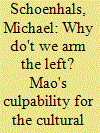| Srl | Item |
| 1 |
ID:
006586


|
|
|
|
|
| Publication |
New York, M E Sharpe, 1996.
|
| Description |
xx, 400p.hbk
|
| Standard Number |
1563247364
|
|
|
|
|
|
|
|
|
|
|
|
Copies: C:1/I:0,R:0,Q:0
Circulation
| Accession# | Call# | Current Location | Status | Policy | Location |
| 038308 | 951.056/SCH 038308 | Main | On Shelf | General | |
|
|
|
|
| 2 |
ID:
073936


|
|
|
|
|
| Publication |
Harvard, Belknap Press, 2006.
|
| Description |
xiii, 693p.hbk
|
| Standard Number |
06740233323
|
|
|
|
|
|
|
|
|
|
|
|
Copies: C:1/I:0,R:0,Q:0
Circulation
| Accession# | Call# | Current Location | Status | Policy | Location |
| 051682 | 951.056/MAC 051682 | Main | On Shelf | General | |
|
|
|
|
| 3 |
ID:
118915


|
|
|
|
|
| Publication |
2012.
|
| Summary/Abstract |
This paper is concerned with the operational activities of the public security organs of the People's Republic of China during the immediate post-1949 period of regime consolidation. The main part of the paper is a case-study of a 1950 pilot scheme to recruit agents in critical sectors of industry and trade in the city of Yingkou in Northeast China, a scheme in due course subsumed under a nationwide programme with a similar focus. In the years to follow, the operational recruitment of agents would become one of China's arguably most important operational responses to the twin Cold War threats of economic espionage and-above all-sabotage. This paper's findings suggest, with respect to operational activities, that in order to represent and explain more fully, in Leopold von Ranke's words, 'how things really were', social and political historians may well want to shift their focus away from successive highly public Maoist 'mass movements' and look instead to what transpired out of the public eye in the interregnum of ordinary times that such movements punctuated. If and when they do, they will discover significant yet hitherto largely unexplored similarities between the work of the early People's Republic of China public security organs and their counterparts in the Soviet Union and other (former) socialist states.
|
|
|
|
|
|
|
|
|
|
|
|
|
|
|
|
| 4 |
ID:
064550


|
|
|